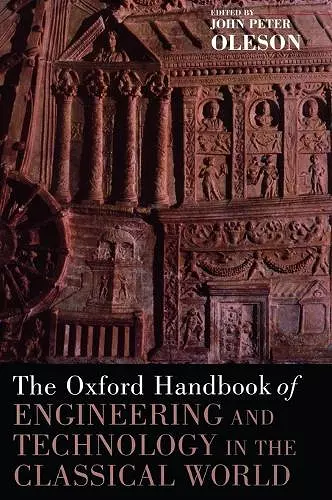The Oxford Handbook of Engineering and Technology in the Classical World
Format:Hardback
Publisher:Oxford University Press Inc
Published:7th Feb '08
Currently unavailable, and unfortunately no date known when it will be back
This hardback is available in another edition too:
- Paperback£64.00(9780199734856)

Nearly every aspect of daily life in the Mediterranean world and Europe during the florescence of the Greek and Roman cultures is relevant to the topics of engineering and technology. This volume highlights both the accomplishments of the ancient societies and the remaining research problems, and stimulates further progress in the history of ancient technology. The subject matter of the book is the technological framework of the Greek and Roman cultures from ca. 800 B.C. through ca. A.D. 500 in the circum-Mediterranean world and Northern Europe. Each chapter discusses a technology or family of technologies from an analytical rather than descriptive point of view, providing a critical summation of our present knowledge of the Greek and Roman accomplishments in the technology concerned and the evolution of their technical capabilities over the chronological period. Each presentation reviews the issues and recent contributions, and defines the capacities and accomplishments of the technology in the context of the society that used it, the available "technological shelf," and the resources consumed. These studies introduce and synthesize the results of excavation or specialized studies. The chapters are organized in sections progressing from sources (written and representational) to primary (e.g., mining, metallurgy, agriculture) and secondary (e.g., woodworking, glass production, food preparation, textile production and leather-working) production, to technologies of social organization and interaction (e.g., roads, bridges, ships, harbors, warfare and fortification), and finally to studies of general social issues (e.g., writing, timekeeping, measurement, scientific instruments, attitudes toward technology and innovation) and the relevance of ethnographic methods to the study of classical technology. The unrivalled breadth and depth of this volume make it the definitive reference work for students and academics across the spectrum of classical studies.
compulsory (as well as entertaining) reading for any academic, student or lay-man * Francesco Trifilo, Rosetta *
The various survey and analytical essays in this volume provide specific answers to questions relating to ancient technology and engineering in classical antiquity and serve as an excellent starting point for further investigation by providing current bibliographies of major scholarship on the subjects covered. The embracing purpose of this series, I believe, is to make the Oxford Handbooks the acknowledged first place to go to gain entry into an unfamiliar aspect of the ancient world. If such is the aspiration for this new series, Oleson's volume meets and exceeds the goal and, in doing so, sets the gold standard for other handbook volumes now in preparation for publication by the Oxford University Press and other publishing houses. * Robert L. Hohlfelder, American Journal of Archaeology *
The finished product represents a new milestone for Oxford and for the field. Each of the eight parts to the book is a stand-alone tour de force that deserves enormous praise for its organization, its comprehensiveness, and its promise for impacting future studies. * Technology and Culture *
One may make it clear, right from the start, that this is a superb production, ably edited by John Oleson, full and comprehensive, and, being devoted to technology, filling a long-felt gap. * Classical Review *
It can be said at once that this is an excellent book that will serve classicists reliably as a basic work of reference. The level of scholarship is very high, the writing generally clear, the breadth of coverage impressive. * Journal of Roman Archaeology *
- Winner of Winner, Eugene S. Ferguson Prize, Society for the History of Technology.
ISBN: 9780195187311
Dimensions: 170mm x 249mm x 46mm
Weight: 1721g
896 pages